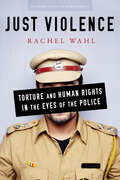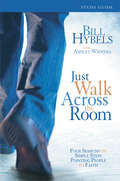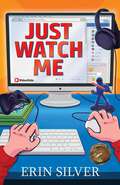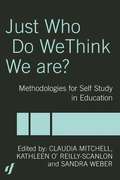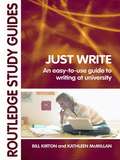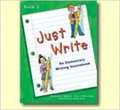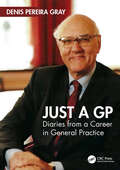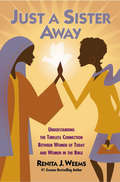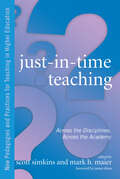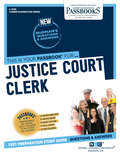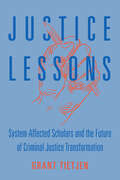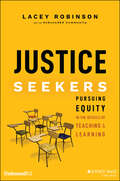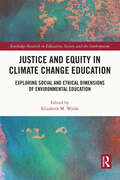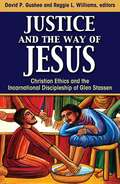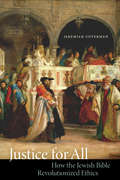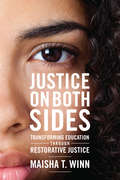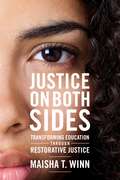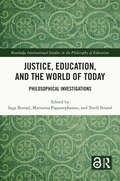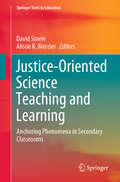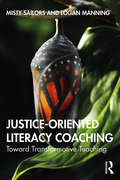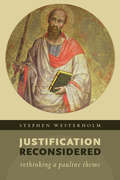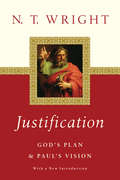- Table View
- List View
Just Violence: Torture and Human Rights in the Eyes of the Police
by Rachel WahlPolice who engage in torture are condemned by human rights activists, the media, and people across the world who shudder at their brutality. Stark revelations about torture by American forces at places like Guantanamo Bay have stoked a fascination with torture and debates about human rights. Yet despite this interest, the public knows little about the officers who actually commit such violence. How do the police understand what they do? How do their beliefs inform their responses to education and activism against torture? Just Violence reveals the moral perspective of perpetrators and how they respond to human rights efforts. Through interviews with law enforcers in India, Rachel Wahl uncovers the beliefs that motivate officers who use and support torture, and how these beliefs shape their responses to international human rights norms. Although on the surface Indian officers' subversion of human rights may seem to be a case of "local culture" resisting global norms, officers see human rights as in keeping with their religious and cultural traditions—and view Western countries as the primary human rights violators. However, the police do not condemn the United States for violations; on the contrary, for Indian police, Guantanamo Bay justifies torture in New Delhi. This book follows the attempts of human rights workers to both persuade and coerce officers into compliance. As Wahl explains, current human rights strategies can undermine each other, leaving the movement with complex dilemmas regarding whether to work with or against perpetrators.
Just Walk Across the Room Participant's Guide: Four Sessions on Simple Steps Pointing People to Faith
by Bill Hybels Ashley WiersmaPastor Bill Hybels’s firm conviction is that the highest value in personal evangelism is being attuned to and cooperative with the promptings of the Holy Spirit. This means playing only the role you are intended to play—walking when the Spirit says to walk, talking when the Spirit says to talk, and falling silent when the Spirit suggests that you’ve already said enough. More than two thousand years ago, Jesus himself introduced the perfect model for evangelism. He left the marvelous adoration of the angels and the perfection of heaven, and he chose to “walk” clear across the cosmos. He had no memorized script, no forced formulas. Instead, he was armed only with an offer of redemption to people just like you and me, many of whom were neck-deep in pain of their own making. Today, the goal for every Christian is to reflect Christ’s love and follow his example by taking simple walks across rooms—leaving our circles of comfort and extending hands of care, compassion, and inclusiveness to people living far from God. Designed for use with the video.
Just Watch Me!
by Erin SilverTwelve-year-old Simon Rosen has qualified for the Canadian Video Game Championships in Vancouver. If he can get straight A&’s in school, his parents have agreed to take him. The stakes are especially high: his parents are always fighting, and if he can just get them to Vancouver—the place where they fell in love—maybe he can save his family from the brink of divorce.
Just Who Do We Think We Are?: Methodologies for Autobiography and Self-Study in Education
by Claudia Mitchell Sandra Weber Kathleen O'Reilly-ScanlonDrawing upon diverse and specific examples of self-study, described here by the practitioners themselves, this unique book formulates a methodological framework for self-study in education. This collection brings together a diverse and international range of self-studies carried out in teacher education, each of which has a different perspective to offer on issues of method and methodology, including: * memory work* fictional practice* collaborative autobiography* auto-ethnography* phenomenology* image-based approaches. Such ethical issues likely to arise from self-study as informed consent, self-disclosure and crises of representation are also explored with depth and clarity. As method takes centre stage in educational and social scientific research, and self-study becomes a key tool for research, training, practice and professional development in education, Just Who Do We Think We Are? provides an invaluable resource for anyone undertaking this form of practitioner research.
Just Write: An Easy-to-Use Guide to Writing at University
by Bill Kirton Kathleen M McMillanThis is a basic, short guide that helps students make the transition to writing at college or university as simple as possible, providing them with the basic skills they need to write in an effective academic style. The authors draw on their own work to demystify the academic writing process that many students, in all disciplines, find daunting. By understanding exactly what obstacles students face when approaching writing at university they offer proven advice that is simple, uncomplicated and easily achievable. Clear and accessible, this book gives students step-by-step advice to overcome the main hurdles. It covers: overcoming apprehension – then making sure you know exactly what you are supposed to do planning reading – managing your time and keeping your focus, helping you get the material that needs to be in your work getting organised – you are ready to write the first draft, take a break and finally come back and edit it. Jargon-free, the book helps students at all levels of higher education to write clearly and persuasively, expressing both opinions and findings.
Just Write: Creativity and Craft in Writing (Just Write Series #Book 2)
by Alexandra S. Bigelow Elsie WilmerdingThis book was written for your enjoyment. Have fun discovering different ways to write! Before you begin any exercise, please take the time to flip through the entire book.
Just a GP: Diaries from a Career in General Practice
by Denis Pereira Gray‘With General Practice currently facing existential challenges, it is truly inspirational to be reminded what determined individuals, with a clear set of intensely human values, can achieve… This is the story of an extraordinary career during a profoundly important phase in the history of British medicine – someone who was justifiably proud to be “just a GP”.’Sir David Haslam CBE FRCGPPast President and Chairman of Council, Royal College of General PractitionersPast President, British Medical AssociationPast Chair, National Institute for Health and Care Excellence (NICE)This autobiography from Sir Denis Pereira Gray offers a unique insight into the life and career of a hugely distinguished and influential general practitioner, from what led him to study medicine, learning his craft in the 1960s, through years of clinical practice and research to senior leadership roles within and outside the Royal College of General Practitioners.Through detailed diaries enlivened by wonderful anecdotes, both personal and professional, Sir Denis shares candidly with the reader a lifetime of experience gained and lessons learned, highly applicable today when general practice is facing many challenges and detractors.Both informative and inspirational, Just a GP is an essential read for many who have journeyed through the profession with Sir Denis and those who are in the midst of or contemplating a career in general practice today.
Just a Sister Away: Understanding the Timeless Connection Between Women of Today and Women in the Bible
by Renita J. WeemsThe "Essence" bestselling author of "Listening for God" reveals the timeless connection between today's women and their biblical sisters--and how to live a better life because of it.
Just in Time Teaching: Across the Disciplines, and Across the Academy
by Mark H. Maier Scott P. SimkinsJust-in-Time Teaching (JiTT) is a pedagogical approach that requires students to answer questions related to an upcoming class a few hours beforehand, using an online course management system. While the phrase “just in time” may evoke shades of slap-dash work and cut corners, JiTT pedagogy is just the opposite. It helps students to view learning as a process that takes time, introspection, and persistence. Students who experience JiTT come to class better prepared, and report that it helps to focus and organize their out-of-class studying. Their responses to JiTT questions make gaps in their learning visible to the teacher prior to class, enabling him or her to address learning gaps while the material is still fresh in students’ minds – hence the label “just in time.”JiTT questions differ from traditional homework problems in being designed not only to build cognitive skills, but also to help students confront misconceptions, make connections to previous knowledge, and develop metacognitive thinking practices. Students consequently spend more time on course concepts and ideas, but also read their textbooks in ways that result in more effective and deeper learning. Starting the class with students’ work also dramatically changes the classroom-learning environment, creating greater student engagement.This book demonstrates that JiTT has broad appeal across the academy. Part I provides a broad overview of JiTT, introducing the pedagogy and exploring various dimensions of its use without regard to discipline. Part II of the book demonstrates JiTT’s remarkable cross-disciplinary impact with examples of applications in physics, biology, the geosciences, economics, history, and the humanities. Just-in-Time Teaching article from The Hispanic Outlook in Higher EducationReprinted with permission from Hispanic Outlook in Higher Education Magazine. www.hispanicoutlook.com
Justice Court Clerk: Passbooks Study Guide (Career Examination Series)
by National Learning CorporationThe Justice Court Clerk Passbook® prepares you for your test by allowing you to take practice exams in the subjects you need to study. It provides hundreds of questions and answers in the areas that will likely be covered on your upcoming exam, including but not limited to: record keeping and organization of data; clerical operations, including proofreading; understand and interpret written material, including legal policies and procedures; and other related areas.
Justice Lessons: System-Affected Scholars and the Future of Criminal Justice Transformation
by Grant E. TietjenSince the 1990s, the community of scholar-activists who have had contact with the criminal legal system has grown rapidly, solidifying into an international movement. Drawing on in-depth conversations with system-affected academics as well as his own experience with incarceration, Grant E. Tietjen traces the history, positive impacts, and future promise of this movement. By offering networks of support to system-affected people seeking higher education and using the perspectives afforded them by their lived experiences to push their disciplines forward, the movement effects reciprocal changes between the individual and the entire institution of higher education. These changes, Tietjen argues, ripple outward and stand to contribute to the wider movement against carceral responses to harm.
Justice Seekers: Pursuing Equity in the Details of Teaching and Learning
by Lacey RobinsonRevolutionary solutions for an American school system that is systemically failing Black and brown children In Justice Seekers, celebrated social justice activist and veteran educator Lacey Robinson delivers an engaging combination of storytelling and research that explains why justice is something that is happening—or not happening—inside the classroom and within the details of teaching and learning. You’ll explore ways to identify and eliminate the shame-inducing pedagogies impacting Black and brown children from classrooms and the world at large. In the book, you’ll discover the many ways that justice is in the details of race, pedagogy, and standards-driven education, as well as: Strategies for challenging educators to see the ways in which they can contribute to eradicating racial inequity from the classroom and from society New ways to recognize and reduce the impact of low cognitive demand material presented to Black and brown children in schools across America Methods for improving the quality of your own teaching here and nowAn intuitive and exciting roadmap for K-12 teachers, teachers-in-training, school administrators, and principals who aim to reverse the racial injustices today’s children face every day, Justice Seekers also belongs in the hands of instructional coaches, coordinators, and concerned parents everywhere.
Justice and Equity in Climate Change Education: Exploring Social and Ethical Dimensions of Environmental Education (Routledge Research in Education, Society and the Anthropocene)
by Elizabeth M. WalshThis volume looks at the ways in which climate change education relates to broader ideas of justice, equity, and social transformation, and ultimately calls for a rapid response to the need for climate education reform. Highlighting the role of climate change in exacerbating existing societal injustices, this text explores the ethical and social dimensions of climate change education, including identity, agency, and societal structure, and in doing so problematizes climate change education as an equity concern. Chapters present empirical analysis, underpinned by a theoretical framework, and case studies which provide critical insights for the design of learning environments, curricula, and everyday climate change-related learning in schools. This text will benefit researchers, academics, educators, and policymakers with an interest in science education, social justice studies, and environmental sociology more broadly. Those specifically interested in climate education, curriculum studies, and climate adaption will also benefit from this book.
Justice and Equity in Climate Change Education: Exploring Social and Ethical Dimensions of Environmental Education (Routledge Research in Education, Society and the Anthropocene)
by Elizabeth M. WalshThis volume looks at the ways in which climate change education relates to broader ideas of justice, equity, and social transformation, and ultimately calls for a rapid response to the need for climate education reform. Highlighting the role of climate change in exacerbating existing societal injustices, this text explores the ethical and social dimensions of climate change education, including identity, agency, and societal structure, and in doing so problematizes climate change education as an equity concern. Chapters present empirical analysis, underpinned by a theoretical framework, and case studies which provide critical insights for the design of learning environments, curricula, and everyday climate change-related learning in schools. This text will benefit researchers, academics, educators, and policymakers with an interest in science education, social justice studies, and environmental sociology more broadly. Those specifically interested in climate education, curriculum studies, and climate adaption will also benefit from this book.
Justice and the Way of Jesus: Christian Ethics and the Incarnational Discipleship of Glen Stassen
by David P. Gushee and Reggie L. WilliamsThis edited volume will offer a rich engagement with the theological ethics of Glen Stassen (1936-2014). Eighteen Christian theologians and ethicists, mainly of senior status, will particularly engage Stassen’s last major theological-ethical proposal, encapsulated in his term “incarnational discipleship.” By this term, Stassen intended a statement of the central norm or framework for Christian ethics grounded in the holistic sovereignty of God over all of life, the Lordship of a thick, historical, incarnate, realistic Jesus, and a Holy Spirit who frees believers from any ideological captivities that block our obedience to our Sovereign God and the Lord Jesus Christ. Stassen thought he had arrived at such a pivotal insight that he hoped it would catch on and become a major concept across the discipline, something like Christian realism, liberation ethics, or narrative ethics. However, he died before he had the opportunity to do more than propose the concept.
Justice for All: How the Jewish Bible Revolutionized Ethics (JPS Essential Judaism)
by Jeremiah UntermanJustice for All demonstrates that the Jewish Bible, by radically changing the course of ethical thought, came to exercise enormous influence on Jewish thought and law and also laid the basis for Christian ethics and the broader development of modern Western civilization. Jeremiah Unterman shows us persuasively that the ethics of the Jewish Bible represent a significant moral advance over Ancient Near East cultures. Moreover, he elucidates how the Bible’s unique conception of ethical monotheism, innovative understanding of covenantal law, and revolutionary messages from the prophets form the foundation of many Western civilization ideals. Justice for All connects these timeless biblical texts to the persistent themes of our times: immigration policy, forgiveness and reconciliation, care for the less privileged, and attaining hope for the future despite destruction and exile in this world.
Justice on Both Sides: Transforming Education Through Restorative Justice (Race and Education)
by Maisha T. WinnRestorative justice represents &“a paradigm shift in the way Americans conceptualize and administer punishment,&” says author Maisha T. Winn, from a focus on crime to a focus on harm, including the needs of both those who were harmed and those who caused it. Her book, Justice on Both Sides, provides an urgently needed, comprehensive account of the value of restorative justice and how contemporary schools can implement effective practices to address inequalities associated with race, class, and gender. Winn, a restorative justice practitioner and scholar, draws on her extensive experience as a coach to school leaders and teachers to show how indispensable restorative justice is in understanding and addressing the educational needs of students, particularly disadvantaged youth. Justice on Both Sides makes a major contribution by demonstrating how this actually works in schools and how it can be integrated into a range of educational settings. It also emphasizes how language and labeling must be addressed in any fruitful restorative effort. Ultimately, Winn makes the case for restorative justice as a crucial answer, at least in part, to the unequal practices and opportunities in American schools.
Justice on Both Sides: Transforming Education through Restorative Justice (Race and Education)
by Maisha T. WinnRestorative justice represents “a paradigm shift in the way Americans conceptualize and administer punishment,” says author Maisha T. Winn, from a focus on crime to a focus on harm, including the needs of both those who were harmed and those who caused it. Her book, Justice on Both Sides, provides an urgently needed, comprehensive account of the value of restorative justice and how contemporary schools can implement effective practices to address inequalities associated with race, class, and gender. <p><p> Winn, a restorative justice practitioner and scholar, draws on her extensive experience as a coach to school leaders and teachers to show how indispensable restorative justice is in understanding and addressing the educational needs of students, particularly disadvantaged youth. Justice on Both Sides makes a major contribution by demonstrating how this actually works in schools and how it can be integrated into a range of educational settings. It also emphasizes how language and labeling must be addressed in any fruitful restorative effort. Ultimately, Winn makes the case for restorative justice as a crucial answer, at least in part, to the unequal practices and opportunities in American schools.
Justice, Education, and the World of Today: Philosophical Investigations (Routledge International Studies in the Philosophy of Education)
by Marianna Papastephanou Torill Strand Inga BostadThis edited book challenges the limits of current educational philosophical discourse and argues for a restored normativisation of education through a powerful notion of justice. Moving beyond conventional paradigms of how justice and education relate, the book rethinks the promotion of justice in, for, and through education in its current state. Chapters combine international and diverse philosophical perspectives with a focus on contemporary issues such as climate change, the COVID-19 pandemic, racism, and migrant crises. Divided into three distinct parts, the book explores the ontological and socio-political grounds underlying our notions of education and justice, and offers self-reflective meta-critique on education philosophers’ tendency of promoting and upholding orthodox visions and missions. Ultimately, the book offers contemporary and innovative philosophical reflections on the link between justice and education, and enriches the discourse through a multi-perspectival and sensitive exploration of the topic. It will be of great interest to scholars, researchers, and postgraduate students in the fields of philosophy of education, education policy and politics, education studies and social justice.
Justice, Education, and the World of Today: Philosophical Investigations (Routledge International Studies in the Philosophy of Education)
by Marianna Papastephanou Torill Strand Inga BostadThis edited book challenges the limits of current educational philosophical discourse and argues for a restored normativisation of education through a powerful notion of justice.Moving beyond conventional paradigms of how justice and education relate, the book rethinks the promotion of justice in, for, and through education in its current state. Chapters combine international and diverse philosophical perspectives with a focus on contemporary issues, such as climate change, the COVID-19 pandemic, racism, and migrant crises. Divided into three distinct parts, the book explores the ontological and socio-political grounds underlying our notions of education and justice, and offers self-reflective meta-critique on education philosophers’ tendency of promoting and upholding orthodox visions and missions. Ultimately, the book offers contemporary and innovative philosophical reflections on the link between justice and education, and enriches the discourse through a multi-perspectival and sensitive exploration of the topic. It will be of great interest to scholars, researchers, and postgraduate students in the fields of philosophy of education, education policy and politics, education studies, and social justice.The Open Access version of this book, available at www.taylorfrancis.com, has been made available under a Creative Commons Attribution-Non Commercial-No Derivatives 4.0 license. Funded by University of Oslo.
Justice-Oriented Science Teaching and Learning: Anchoring Phenomena in Secondary Classrooms (Springer Texts in Education)
by David Steele Alison K. MercierThis textbook provides K-12 science teachers and educators innovative uses of anchoring phenomenon-based teaching approaches from a justice-oriented lens (Morales-Doyle, 2017). It discusses topics such as the use of anchoring phenomenon-based pedagogies, qualities of productive anchoring phenomena and includes examples of unit plans that use anchoring phenomena and social justice science issues to create storylines to foster students’ multiple pathways to knowing and learning in the science classrooms. The book is beneficial to K-12 science teachers and science educators who are interested in facilitating students’ sense-making of a real-world phenomenon and engaging in three-dimensional science instruction (NGSS Lead States, 2013). By providing examples of unit plans based on theoretical groundings of anchoring phenomenon-based instruction and justice-oriented science teaching, this book provides a great resource to students, professionals, teachers, and academics in science education.
Justice-oriented Literacy Coaching: Toward Transformative Teaching
by Misty Sailors Logan ManningThis book explores notions of justice-oriented literacy coaching and offers a way of being in the world with young people, teachers, and communities that centers transformative coaching, teaching, and learning. It is intended to disrupt the traditional and historical positioning of literacy coaches in schools today. Through the lens of social justice and liberatory education, Sailors and Manning begin a dialogue with literacy coaches to help them reconsider their own roles and positions as agents of change in schools. Using vignettes and stories to illustrate potential paths into emancipatory literacy learning environments, the authors present literacy as a socially-situated act of meaning-making. Accessible and inviting, this book provides pragmatic tools for literacy leaders to embody social justice, to grapple with big social concepts, to imagine possibilities, and to stimulate creative thinking with the teachers at their schools and with the students in their classrooms. Intended for literacy coaches in grades K-6 and graduate students in literacy education, this book includes a wealth of resources and examples from real-world contexts, as well as spaces for the reader to interact and engage with the text through journaling and self-reflection.
Justification Reconsidered: Rethinking A Pauline Theme
by Stephen WesterholmMuch has been written of late about what the apostle Paul really meant when he spoke of justification by faith, not the works of the law. This short study by Stephen Westerholm carefully examines proposals on the subject by Krister Stendahl, E. P. Sanders, Heikki Raisanen, N. T. Wright, James D. G. Dunn, and Douglas A. Campbell. In doing so, Westerholm notes weaknesses in traditional understandings that have provoked the more recent proposals, but he also points out areas in which the latter fail to do justice to the apostle.Readers of this book will gain not only a better grasp of the ongoing theological debate about justification but also a more nuanced overall understanding of Paul.
